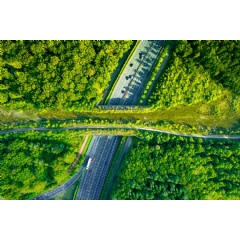Multilateral development banks must supercharge nature-positive finance
In advance of this year’s World Bank and IMF Spring Meetings, WWF’s Global Finance Practice Lead, Aaron Vermeulen, calls on governments and central banks gathering in Washington D.C. to shape a resilient, nature-positive global economy that delivers lasting prosperity.
Finance is a powerful lever for change, and the age of nature-positive finance is dawning.
As climate and ecosystem breakdown continue to wreak havoc across the world, financial regulators, insurers, bankers and investors are waking up to the fact that our economies and future well-being and prosperity depend on living in harmony with nature.
Global climate, nature and development goals enshrined in the Paris Agreement, the Kunming-Montreal Global Biodiversity Framework (GBF), and the UN Sustainable Development Goals (SDGs) offer a blueprint for a sustainable future - and for companies and financial institutions pursuing it, the prospects are good. Transitioning to a nature-positive global economy could generate annual business opportunities worth $10 trillion and create 395 million jobs by 2030, and protecting nature could avert $2.7 trillion in annual economic losses.
Yet despite this promising future, and the GBF requiring financial system alignment with a nature-positive future, governments, companies and financial institutions are still failing to finance climate and nature action at the necessary scale and speed, and transformation in the real economy is painfully slow.
One solution lies in reallocating just some of the $7 trillion invested every year in activities that harm the planet. The GBF calls for the elimination of harmful subsidies, and doing this would help close a $4.1 trillion nature financing gap to meet global climate and nature targets.
Imagine the difference we can make if we repurpose existing finance for activities that heal rather than harm, that benefit nature, people, and communities.
Realizing positive change requires both ‘greening finance’ by better integrating environmental risks and opportunities in financial decision-making, and ‘financing green’, by increasing investment in sustainable initiatives such as nature-based solutions.
The World Bank, the International Monetary Fund (IMF), and regional multilateral development banks (MDBs) have a central role to play in advancing this agenda, which should be at the heart of long talked about MDB reforms.
At COP26 in Glasgow, MDBs issued a joint nature statement committing to putting nature at the heart of their decision-making. Now they must implement it through financing strategies that make climate resilience and nature restoration central to delivering poverty alleviation and prosperity in the countries and economies most in need.
Investment in emerging and developing economies that hold some of the planet’s richest stocks of natural capital in places such as the Amazon, the Congo, and the Mekong should be a priority. Especially important for these economies is better access to both public and private capital so that they can invest in sustainable, climate-resilient development and maintain critical ecosystem services. To keep the 1.5°C Paris target in reach, for instance, they need $2.4 trillion in annual investment by 2030.
In providing better access to capital, MDBs must make more effective use of their balance sheets and scale finance for inclusive, resilient development. They must also provide concessional finance that unlocks private investment in nature and climate action by allowing developing countries to access it at affordable rates. This will drive private finance alignment with net zero and nature-positive targets, and convert the billions in already available public money into the trillions in blended finance necessary for a just transition.
Nature-rich emerging and developing economies also need support in connecting to global value chains so that they can benefit from meeting the requirements of new and emerging laws in developed economies such as the EU regulation on deforestation-free products, as well as from supplying materials to high-technology transition sectors.
Other priorities include supporting sustainable smallholder agriculture, developing taxonomies and metrics for sustainable investment, and shaping sustainable infrastructure. Realizing the opportunities means tailoring solutions to specific contexts rather than imposing generic approaches. And MDB board members can foster cooperation with debtor countries to mitigate environmental threats, implement sustainability, and ensure transparency and accountability.
In parallel, MDBs can also work with regulators to green the financial system. In particular, they must head off an impending debt crisis by restructuring debts for countries spending more repaying creditors than on health or education, and by making sovereign debt markets fit-for-purpose so that new loans support sustainability through mechanisms such as debt-for-nature swaps.
Recent years have seen tremendous growth in sustainable finance. Most recently, the establishment of the Taskforce on Nature-related Financial Disclosures, has triggered increased private sector interest in nature. The opportunities for investment in climate and nature action continue to grow, and innovative blended finance mechanisms such as the Dutch Fund for Climate and Development are helping to scale blended finance and enable private investment in bankable nature solutions in developing economies.
WWF is fully committed to furthering a ‘greening finance, financing green’ agenda together with our financial sector partners. Advancing it should also be a priority for governments and central banks gathering for this year’s World Bank and IMF Spring Meetings. Nearly 80 years on from the historic Bretton Woods conference that shaped the postwar economic era, we need a new approach that addresses today’s global crises and lays the foundations for lasting prosperity.
We live in a nature-based global economy. Whether or not we prosper in one depends on how successful governments and MDBs are this decade in tackling the climate crisis and financing a global economy that works with nature rather than against it. Spring in Washington D.C. would be a good time to start.
( Press Release Image: https://photos.webwire.com/prmedia/6/320633/320633-1.jpg )
WebWireID320633
This news content was configured by WebWire editorial staff. Linking is permitted.
News Release Distribution and Press Release Distribution Services Provided by WebWire.
